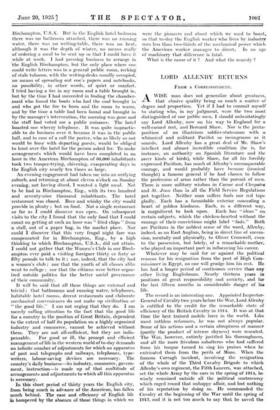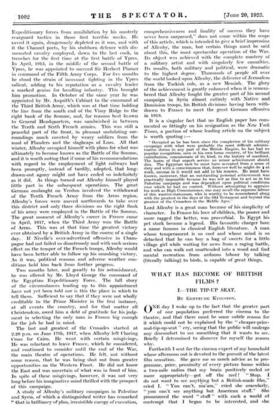A WISE man does not generalize about greatness, that elusive quality
being so much a matter of degree and proportion. Yet if I had to commit myself to stating who, in my judgment, were the two most distinguished of our public men. I should unhesitatingly say Lord Allenby, now on his way to England for a well-earned rest, and Bernard Shaw. Nor is the juxta- sounds. Lord Allenby has a great deal of Mr. Shaw's intellect and almost incredible erudition (he is, for instance, an authority on Spanish literature and the rarer kinds of birds), while Shaw, for all his forcibly expressed Pacifism, has much of Allenby's unconquerable courage, and would probably have become (ironical thought) a famous general if he had chosen to follow the profession of arms rather than the pursuit of men. There is more military wisdom in Caesar and Cleopatra and St. Joan. than in all the Field Service Regulations put together. Neither man suffers fools nor red tape gladly. Each has a formidable exterior concealing a heart of golden kindness. Each, in a different way, is magnificent to look upon. Each has " ideas " on certain subjects, which the chicken-hearted without the courage of their convictions might label " fads." Both are Puritans in the noblest sense of the word, Allenby, indeed, as an East Anglian, being in direct line of succes- sion, mentally and physically, to Oliver Cromwell, even to the possession, but lately, of a remarkable mother, who played an important part in influencing his career.
Whatever may be said for or against the political reasons for his resignation from the post of High Com- missioner in Egypt, no one will grudge him his rest. He has had a longer period of continuous service than any other living Englishman. Nearly thirteen years in positions of great responsibility and anxiety, and for the last fifteen months in considerable danger of his life.
The record is an interesting one. Appointed Inspector- General of Cavalry two years before the War, Lord Allenby is entitled to the credit for the remarkable state of efficiency of the British Cavalry in 1914. It was at that time the best trained mobile force in the world. Like most ruthless reformers, he was not always popular. Some of his actions and a certain abruptness of manner (partly the product of intense shyness) were resented. The War, however, entirely justified his thoroughness, and all the more frivolous subalterns who had suffered from his tongue turned to sing his praises when he extricated them from the perils of Mons. When the famous Curragh incident, involving the resignation of the whole of the Third Cavalry Brigade to which Allenby's own regiment, the Fifth Lancers, was attached, set the whole Army by the ears in the spring of 1914, he wisely remained outside all the political controversy which raged round that unhappy affair, and lost nothing of his reputation by doing so. He commanded the Cavalry at the beginning of the War until the spring of 1915, and it is not too much to say that he saved the Expeditionary forces from annihilation by his masterly rearguard tactics in those first terrible weeks. He saved it again, dangerously depleted as it was, and with it the Channel ports, by his stubborn defence with dis- mounted cavalry employed, down to the last cook, in trenches for the first time at the first battle of Ypres. In April, 1915, in the middla of the second battle of Ypres, he was appointed to succeed Sir Herbert Plumer • in command of the Fifth Army Corps. For five months he stood the strain of incessant fighting in the Ypres salient, adding to his reputation as a cavalry leader a marked genius for handling infantry. This brought him promotion. In October of the same year he was appointed by Mr. Asquith's Cabinet to the command of the Third British Army, which was at that time holding the line from the south end of the Vimy Ridge to the right bank of the Somme, and, for reasons best known to General Headquarters, was sandwiched in between the Tenth and Sixth French armies. This was still a peaceful part of the front, in pleasant undulating sur- roundings much coveted by weary soldiers from the mud of Flanders and the slagheaps of Loos. All that winter, Allenby occupied himself with plans for what was ultimately to become known as the Battle of the Somme, and it is worth noting that if some of his recommendations with regard to the employment of light railways had been promptly, instead of tardily, adopted, that long- drawn-out agony might not have ended so indefinitely as it did. As things turned out Allenby himself played little part in the subsequent operations. The great German onslaught on Verdun involved the withdrawal of the Tenth French Army from the Arras region. Allenby's forces were moved northwards to take over this district and only three divisions on the right flank of his army were employed in the Battle of the Somme. The great moment of Allenby's career in France came in April, 1917, when the Third Army won the Battle of Arras. This was at that time the greatest victory ever obtained by a British Army in the course of a single day. If Nivelle's over-advertised offensive in Cham- pagne had not failed so disastrously and with such serious effect on the temper of the French troops, Allenby would have been better able to follow up his smashing victory. As it was, political reasons and adverse weather con- ditions held him back from further progress. Two months later, and greatly to his astonishment, he was offered by Mr. Lloyd George the command of the Egyptian Expeditionary Force. The full story of the circumstances leading up to this appointment have not yet been told nor is this the place in which to tell them. Sufficient to say that if they were not wholly creditable to the Prime Minister in the first instance, at all events the country, and for that matter all Christendom, owed him a debt of gratitude for his judg- ment in selecting the only man in France big enough for the job he had in mind. The last and greatest of the Crusades started at 2.20 p.m. on June 17th, 1917, when Allenby left Charing Cross for Cairo. He went with certain misgivings. He was reluctant to leave France, which he considered, and continued to consider until the end of the War, the main theatre of operations. He felt, not without some reason, that he was being shut out from greater opportunities on the Western Front. He did not know the East and was uncertain of what was in front of him. In spite of these misgivings, however, it was not very long before his imaginative mind thrilled with the prospect of this campaign. A study of Allenby's military campaigns in Palestine and Syria, of which a distinguished writer has remarked that in brilliancy of plan, irresistible energy of execution, comprehensiveness and finality or success they have never been surpassed," does not come within the scope of this article, which is intended to give a brief impression of Allenby, the man, but certain things must be said about this, the most spectacular operation of the War. -Its object was achieved with the complete mastery of a military artist and with singularly few casualties. Its results, both military and political, were dramatic to the highest degree. Thousands of people all over • the world looked upon Allenby, the deliverer of Jerusalem from the Turkish rule, as a new Messiah. The glory of the achievement is greatly enhanced when it is remem- bered that Allenby fought the greater part of his second campaign in Syria almost entirely with Native and Dominion troops, his British divisions having been with- drawn to France to meet the great German offensive in 1918.
It is a singular fact that no English paper has com- mented so fittingly on his resignation as the New York Times, a portion of whose leading article on the subject is worth quoting :- " Occupied as he has been since the completion of his military campaign with what were probably the most difficult adminis- trative duties in any part of the British Empire, he has had no popular recognition, save in his own home country, of his brilliant contribution, consummate of its kind, to the history of mankind. The lustre of that superb service no minor achievement should dim. The Egyptian task he must have accepted from a sense of duty and with a consciousness that, however well he might do Pat work, success in it would not add to his renown. Ho must have
known, moreover, that an outstanding personal achievement was practically impossible because he was not as free to act as in his Palestine campaign and was dependent upon political conditions over which ho had no control. Without attempting to appraizo his work as High Commissioner, one may recall the supreme labour of this warrior-statesman, who is worthy to be remembered along with the greatest in the days of the Old Testament and beyond tho • greatest of the Crusaders in the Middle Ages."
Lord Allenby is a great man because of his simplicity of character. In France his love of children, the poorer and more ragged the better, was proverbial. In Egypt his pet stork became a legend. His favourite charger bore a name famous in classical English literature. A man whose temperament is so cool and whose mind is so detached that he can buy a bag of sweets for a little village girl while waiting for news from a raging battle, and who can walk out unattended into a wood and find mental recreation from arduous labour by talking (literally talking) to birds, is capable of great things.











































 Previous page
Previous page